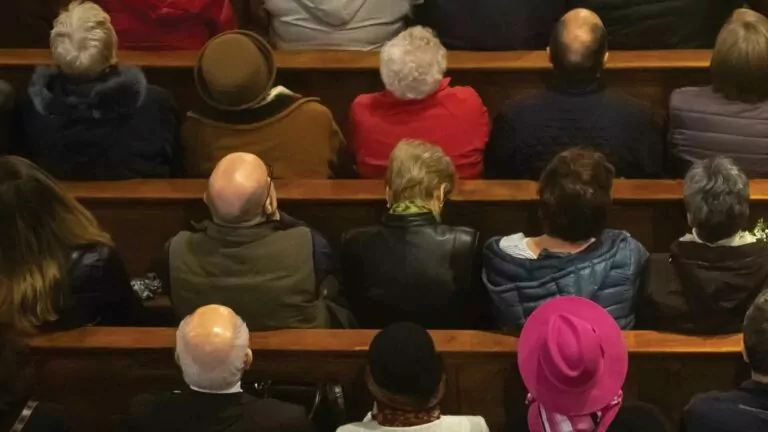Your presence alone can be a comfort
*****
Not long ago I was directing a funeral, and the service was about to begin. The doors to the sanctuary opened to myself and the pastor, and, most importantly, the grieving widower and his family. Waiting for us were 400 guests in attendance. There was an audible gasp and fresh tears from the family, followed by a brief pause as they took in this overwhelming show of support. We walked down the aisle to the reserved pews, surrounded by a sea of compassionate faces, an earthly cloud of witnesses. I was struck by the visible comfort this community gave the family simply by showing up. Their presence was a gift I don’t think the family will ever forget.
An experience like this highlights how funerals are community events. It also shows us the opportunity, and with that the responsibility, we have to be a support system. We can learn here, too, some practical ways we can care for the grieving family among us.
Practical advice
In our church tradition, it is typical that a family would choose to have a time of visitation prior to the funeral event. The visitation is often our first opportunity to show up for the family. This is a time where you are invited to share in the family’s burden of missing their loved one. It is a time to mourn with those who mourn, but also an opportunity to reflect on God’s faithfulness in their loved one’s life. In many ways, it is a sacred time.
Maybe you have found yourself at visitation for someone with a particularly tragic circumstance surrounding their death: perhaps a child has died, or a sudden accident or illness has occurred, rocking the community and stirring your heart to express your condolences. Especially in those circumstances you may find you don’t have the right words to say.
Know that first and foremost, your presence alone can be a comfort to the family member.
Second, you may be at a loss for words, and that is okay. At times we don’t understand why God gives and takes away, and we can be tempted to overcompensate with our words, even though that may do more harm than good. While it may be tempting to say, “they’re in a better place” or “all in God’s timing” – even though these might be true – I find it more effective to keep things simple and say something along the lines of, “my condolences to you,” and maybe share a short memory about their loved one. If words escape you, do not be discouraged. Consider Job’s friends, who sat with him in silence for seven days and seven nights upon seeing his grief-stricken state. A grieving family needs your constancy and listening ear, not your ability to take their pain away. A visitation gathering is a visual representation of one’s community. It can be a vulnerable position for a family to receive visitors, while they are mourning and processing their grief, whatever that may look like, but it is healthy for them to see and experience that visible show of support.
While your presence can provide comfort to the family, there are also benefits for the community that attends the visitation. Often times at these events, the casket is present and open for the public to pay their respects to the deceased. In this moment, we are encouraged not only to reflect on God’s faithfulness to this individual, but also His great promises to us in our mortality if we have surrendered our lives to Him. We can be reminded that when we ourselves suffer a great loss, this is the same community that will serve as a hand and foot to us in our time of need. Our gathering together becomes an illustration of something much greater and eternal!
Our responsibility to the family does not necessarily stop at showing our support at the visitation. Attending the funeral also allows you the opportunity to experience the family’s memories shared in eulogies, as well as hear about God’s promises for His children through the words of Scripture read and meditated upon at the funeral service.
Typically, you are also invited to share in a meal after the funeral events. Just as Jesus shared food and fellowship with many during His life leading up to His death, you are invited to break bread with the family, ensure they are nourished physically, and perhaps share stories about their loved one and offer words of encouragement for the days ahead.
Mutual encouragement
In my experience, I have noticed that our seniors in the community show up to visitations faithfully. I would encourage our younger generation to continue this tradition. While perhaps standing in line, or taking a night off from watching a show after work and coming to visitation instead may not sound appealing, this is a calling and responsibility we have as brothers and sisters in Christ.
It is equally encouraging for the children and grandchildren of the deceased to have their friends share in their loss. Often these family members will comment to us how appreciative they were of their friends taking the time to show up for them. I remember a basketball coach being particularly moved when her whole team of grade 9 and 10 students came to the visitation for her late father.
You may be thinking that these practical ways to support the family sound daunting and beyond your abilities. Perhaps you are anxious and don’t know where to begin in supporting the grieving. While I encourage you to attend the events, there are many roles behind the scenes that we witness at every funeral as well. There are individuals such as childcare providers at the church to support little ones in the grieving family, the livestream/AV technicians for the service, the individuals who make food and serve it for the reception, and the list goes one. Be encouraged then, to find your role when it comes to funerals and visitations in your congregation and your community: “As it is, there are many parts but one body” (1 Cor. 12:20).
I would like to leave you with an excerpt from a prayer in Douglas Kaine McKelvey’s Every Moment Holy (Volume II). The title of this prayer is: “A Liturgy Interceding for Those Who Will Gather to Grieve for Me.”
 And so may the fellowship of those
And so may the fellowship of those
who assemble to grieve my passing
become a sharing of sorrow’s burdens,
and a celebration of your long faithfulness
in my life, and still more
a warm recollection of the gifts
we were ever intended
to be to one another.
Kayla Ruggi is funeral director at Kitching, Steepe & Ludwig Funeral Home in Hamilton, Ontario. You can email her at [email protected].







